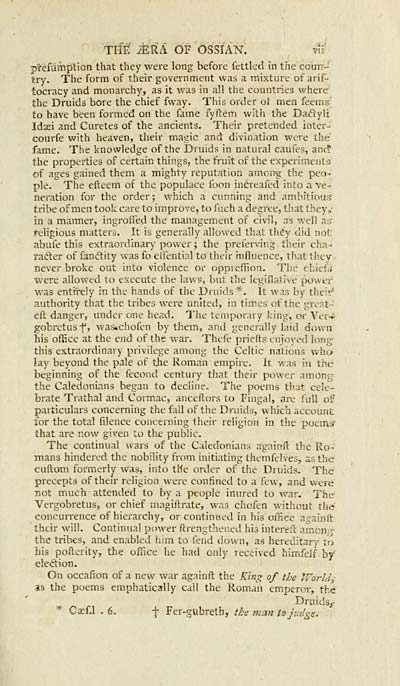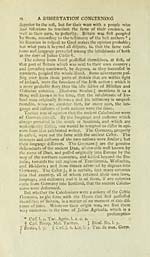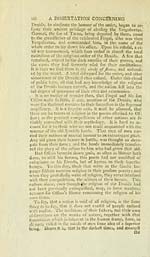Download files
Complete book:
Individual page:
Thumbnail gallery: Grid view | List view

THi! ^RA OF OSSlAN. vn
p?efamption that they were long before fettled in the coinr-'
try. The form of their government was a mixture of arif-
tocracy and monarchy, as it was in all the countries where
the Druids bore the chief fway. This order oi men feems^
to have been formed on the fame fyftem with the Daftyli
Idaei and Curetes of the ancients. Their pretended inter-
courfe with heaven, their magic and divination were the'
fame. The knowledge of the Druids in natural caufes, anr?
the properties of certain things, the fruit of the experiments
of ages gained them a mighty reputation among the peo-
ple. The efteem of the populace foon increafed into a ve-
neration for the order; which a cunning and ambitiouf?
tribe of men took care to improve, to fuch a degree, that they <»•
in a maimer, ingrolfed the management of civil, as well ay
teligious matters. It is generally allowed that th<?y did not.
abufe this extraordinary power ; the preferving their cha •
rader of fandtity was fo eliential to their mfluence, that they
never broke out into violence or opprefiion. The chiefs
were allowed to execute the laws, but the legiflative power
was entirely in the hands of the Druids *. It was by their"
authority that the tribes were united, in times of the great-
eft danger, under one head. The temporary king, or Ver.^
gobretusf, was»chofen by them, and generally laid down
his office at the end of the war. Thefe priefts enjoyed long
this extraordinary privilege among the Celtic nations who
lay beyond the pale of the Roma;n empire. It was in the
beginning of the fccoud century that their power among
the Caledonians began to decline. The poems that cele-
brate Trathal and Cormac, anceflors to Fingal, are full of
particulars concerning the fall of the Druids, which account
lor the total lilence concealing their religion in the poems
that are now given to the public.
The continual wars of the Caledonians againft the Ro-
mans hindered the nobility from initiating themfelves, as the
cuftom formerly was, into the order of the Druids. The
precepts of their religion were confined to a few, and were
not much attended to by a people inured to war. The
Vergobretus, or chief magiltrate, was chofen without the
concurrence of hierarchy, or continued in his office at^ainlt
their will. Continual power ftrengtheued his intereil arnom^
the tribes, and enabled him to fend down, as hereditary to
his pofterity, the office he had only received himfelf by
eleftion.
On occafion of a new war againft the Khig of the JVorhl^
as the poems emphaticzrily call the Roman emperor, the
Druids,-
Cxf.l . 6. f Fer-gubreth, the man tojudg^.
p?efamption that they were long before fettled in the coinr-'
try. The form of their government was a mixture of arif-
tocracy and monarchy, as it was in all the countries where
the Druids bore the chief fway. This order oi men feems^
to have been formed on the fame fyftem with the Daftyli
Idaei and Curetes of the ancients. Their pretended inter-
courfe with heaven, their magic and divination were the'
fame. The knowledge of the Druids in natural caufes, anr?
the properties of certain things, the fruit of the experiments
of ages gained them a mighty reputation among the peo-
ple. The efteem of the populace foon increafed into a ve-
neration for the order; which a cunning and ambitiouf?
tribe of men took care to improve, to fuch a degree, that they <»•
in a maimer, ingrolfed the management of civil, as well ay
teligious matters. It is generally allowed that th<?y did not.
abufe this extraordinary power ; the preferving their cha •
rader of fandtity was fo eliential to their mfluence, that they
never broke out into violence or opprefiion. The chiefs
were allowed to execute the laws, but the legiflative power
was entirely in the hands of the Druids *. It was by their"
authority that the tribes were united, in times of the great-
eft danger, under one head. The temporary king, or Ver.^
gobretusf, was»chofen by them, and generally laid down
his office at the end of the war. Thefe priefts enjoyed long
this extraordinary privilege among the Celtic nations who
lay beyond the pale of the Roma;n empire. It was in the
beginning of the fccoud century that their power among
the Caledonians began to decline. The poems that cele-
brate Trathal and Cormac, anceflors to Fingal, are full of
particulars concerning the fall of the Druids, which account
lor the total lilence concealing their religion in the poems
that are now given to the public.
The continual wars of the Caledonians againft the Ro-
mans hindered the nobility from initiating themfelves, as the
cuftom formerly was, into the order of the Druids. The
precepts of their religion were confined to a few, and were
not much attended to by a people inured to war. The
Vergobretus, or chief magiltrate, was chofen without the
concurrence of hierarchy, or continued in his office at^ainlt
their will. Continual power ftrengtheued his intereil arnom^
the tribes, and enabled him to fend down, as hereditary to
his pofterity, the office he had only received himfelf by
eleftion.
On occafion of a new war againft the Khig of the JVorhl^
as the poems emphaticzrily call the Roman emperor, the
Druids,-
Cxf.l . 6. f Fer-gubreth, the man tojudg^.
Set display mode to: Large image | Transcription
Images and transcriptions on this page, including medium image downloads, may be used under the Creative Commons Attribution 4.0 International Licence unless otherwise stated. ![]()
| Early Gaelic Book Collections > Ossian Collection > Morison's edition of the Poems of Ossian, the son of Fingal > (13) |
|---|
| Permanent URL | https://digital.nls.uk/77716495 |
|---|
| Description | Selected books from the Ossian Collection of 327 volumes, originally assembled by J. Norman Methven of Perth. Different editions and translations of James MacPherson's epic poem 'Ossian', some with a map of the 'Kingdom of Connor'. Also secondary material relating to Ossianic poetry and the Ossian controversy. |
|---|
| Description | Selected items from five 'Special and Named Printed Collections'. Includes books in Gaelic and other Celtic languages, works about the Gaels, their languages, literature, culture and history. |
|---|

